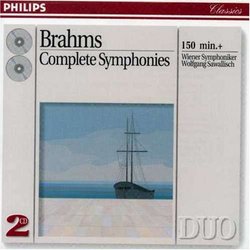Not Bad, But Not Memorable
Jeffrey Lee | Asheville area, NC USA | 10/06/2002
(3 out of 5 stars)
"These are variable performances, ranging from fair to good. Most notable for its absence is a feel for the grand scale, which, if present, might have imparted a sense of stature to Sawallisch's readings. This is especially true of Brahms' First. Interestingly, early in the last movement, the horn call that follows the rushing pizzicati and the crashing chord comes through broadly, smoothly and musically, but after that, things proceed in rather pedestrian fashion. The quickening of the pace near the end lacks real drive and excitement, and the final chord ends on somewhat of an undervitalized note. For outstanding Firsts, go to Van Beinum, (if you can find his stereo Concertgebouw recording), Klemperer/Philharmonia and Walter with the Columbia Symphony. In the Second Symphony, there are some areas of untidy ensemble work. Also, there are moments when Sawallisch's characterization leaves something to be desired. In sum, nothing special. Eugen Jochum's wonderfully shaped Berlin Philharmonic reading (mono), Bruno Walter's eloquent Columbia Symphony and New York Philharmonic (mono) versions, Carl Schuricht's tuneful, relaxed presentation with the SDRSO and Felix Weingarner's lyrical account stand out here. Sawallisch's Brahms Third is his best of the lot. There's little that seems to interfere with what is basically a pretty fine performance. The close of the last movement could have been a little more opulent. The most special Third, however, is Jochum's (again, from his mono Berlin Philharmonic set). His later stereo version with the London Phiharmonic, George Szell's presentation with the Cleveland Orchestra and Weingartner's lively and tuneful offering are also very fine. In the first movement of the Fourth Symphony, there is some unevenness in the flow of the music, and the massed strings of the Vienna Symphony occasionally sound a bit frayed. The playing in the second, third and fourth movements is rather routine. Brahms' great melodies really do not soar. Cream of the crop here are the autumnal Walter, the sweeping Klemperer, the solidly musical Reiner, the taut, yet lyrical Weingartner and the warmly expressive Abendroth. For those who want to go with the same conductor for the Four Brahms Symphonies, my first choices are the collections of Eugen Jochum with the Berlin Philharmonic on DGG's "Originals" (mono only), Felix Weingartner (also in mono on EMI) and Bruno Walter with the Columbia Symphony (individual discs on Sony). Also very fine is Klemperer's Philharmonia/EMI set."
A refreshing approach, but underplayed
Santa Fe Listener | Santa Fe, NM USA | 09/02/2006
(3 out of 5 stars)
"There are so many bargain two-fers of the Brahms symphonies, including stupendous readings from Karajan, Walter, and Toscanini, that price issn't the attraction here. Nor is orchestral finesse and power: the Vienna Sym. was a woebegone ensemble for decdes and manages to sound good here but no better. The real attraction has to be Sawallisch's insights into Brahms.
His main notion is that Brhams should sound lean, brisk, and fresh, much the same approach Sawallishc took in his notable recordings of Schumann for EMI. This is Brahms for springtime. As such, it's quite pleasant, but Sawallisch lacks conviciton, and where the music struggles and strives, he relaxes the tension too much. Even so, within its limits this is a pretty good listening experience."
Wolfgang who ... ?
Steen Mencke | Denmark | 02/21/2010
(5 out of 5 stars)
"OK, I admit it - Wolfgang Sawallisch is not exactly chopped liver. Active as a conductor since 1947 he is now - at the age of 86 - very much an elder statesman of music and something of a legend in Philadelphia, with whose fine orchestra he spent his autumn years from 1993 to 2003. More to the point he is actually one of the twentieth century's supreme interpreters of Schumann, Bruckner and Richard Strauss, in many ways comparable to Günter Wand, whose sense for musical truth he always shared. Oddly enough his recordings of the Brahms symphonies (this one, and the one he made for EMI from 1989 to 1991 as well) have never been awarded any serious attention, an oversight I hereby hasten to remedy.
It may not be flashy, but out of the 25 versions of the complete symphonies by Brahms in my collection (comprising tree of the four sets made by Karajan), this one is the one I keep getting back to time and time again. Though always performing in the shadow of their cousins in the "Philharmonic" the Vienna Symphony is a fine orchestra, and in these inspired performances Sawallisch literally has every man jack playing fit to bleed from the cuticles. Though tempi are never rushed there is an intensity to every movement of these masterpieces that I have rarely encountered before or since, and the finale of the E minor symphony in particular takes us to dramatic hights that I think would have made even Furtwängler proud. The same is very much true for the finale of the D major symphony - played perfectly "molto ben marcato", and rivaled only by Takashi Asahina in his live recording, made when he was almost 90! - which rips open the indolence of that often rather leisurely pastoral work, letting fresh air sweep through every room.
The sound of these Philips remasterings is very good for being almost fifty years old, and though the recording, true to its origins in the early 60's, is fairly closely mic'ed it is never too much. The various instrument sections are remarkably well defined.
A discovery indeed - especially at the price of less than a Big Mac meal."


 Track Listings (8) - Disc #1
Track Listings (8) - Disc #1